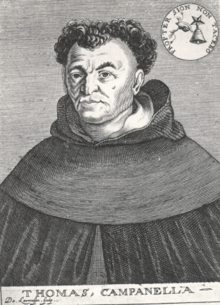Atheism Conquered

Atheism Conquered (Latin: Atheismus Triumphatus) is a philosophical work by the Italian Dominican philosopher Tommaso Campanella.
Campanella himself viewed it as a watershed in his thinking, signaling his detachment from the more openly rationalist positions of his youth and his move toward a more sincere adherence to Christian principles. He described the work as a "volume against politicians and Machiavellians".[1]
Central to the work is his polemic against both reason of state and Niccolò Machiavelli's conception of religion as a political invention, one devised by priests and politicians to gain and maintain power. This polemic is coupled with the need to undertake a far-reaching rational examination, passing in review and evaluating all religious beliefs and philosophical doctrines in order to demonstrate that religion is a natural virtue inborn in human beings. A further motive of his research is to ascertain the relationship between natural religion and Christianity, which leads to the conclusion that there is no conflict between Christian law and natural law but instead a profound and fundamental agreement, since Jesus Christ did not nullify and abolish natural law but rather added to it moral precepts and rites that completed and perfected it.[2]
The work was written in Italian in 1606-1607, during his imprisonment in Neapolitan castles for being accused of leading a conspiracy against the Spanish rule in his hometown of Stilo. The treaty was not published until immediately after it was written, due to the suspicions of the ecclesiastical authorities, who accused the work of Pelagianism.[3]
References
- ↑ Tommaso Campanella entry by Germana Ernst in the Stanford Encyclopedia of Philosophy
- ↑ Tommaso Campanella entry by Germana Ernst in the Stanford Encyclopedia of Philosophy
- ↑ Tommaso Campanella entry by Germana Ernst in the Stanford Encyclopedia of Philosophy